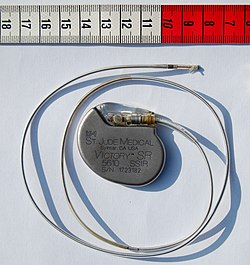Lev's disease

Editor-In-Chief: Prab R Tumpati, MD
Obesity, Sleep & Internal medicine
Founder, WikiMD Wellnesspedia &
W8MD's medical weight loss NYC, sleep center NYC
Philadelphia medical weight loss and Philadelphia sleep clinics
| Lev's disease | |
|---|---|

| |
| Synonyms | Lenegre-Lev syndrome |
| Pronounce | N/A |
| Specialty | N/A |
| Symptoms | Heart block, bradycardia, syncope |
| Complications | Sudden cardiac death |
| Onset | Typically in older adults |
| Duration | Chronic |
| Types | N/A |
| Causes | Fibrosis and calcification of the cardiac conduction system |
| Risks | Aging, hypertension, diabetes mellitus |
| Diagnosis | Electrocardiogram (ECG), Holter monitor, Electrophysiology study |
| Differential diagnosis | Lenegre's disease, Ischemic heart disease, Dilated cardiomyopathy |
| Prevention | N/A |
| Treatment | Pacemaker implantation |
| Medication | N/A |
| Prognosis | Variable, depends on timely treatment |
| Frequency | Rare |
| Deaths | N/A |
Lev's disease is a rare medical condition characterized by the degeneration of the electrical conduction system of the heart. This condition is named after the Russian pathologist Maurice Lev, who first described it in 1950.
Symptoms[edit]
The symptoms of Lev's disease can vary greatly from person to person. Some individuals may not experience any symptoms, while others may experience symptoms such as:
- Fatigue
- Dizziness
- Fainting or near-fainting
- Shortness of breath
- Chest pain
Causes[edit]
Lev's disease is caused by the degeneration of the electrical conduction system of the heart. This degeneration can be due to aging, or it can be caused by other factors such as:
- Heart disease
- Infections that affect the heart
- Certain medications
Diagnosis[edit]
Diagnosis of Lev's disease typically involves a thorough medical history and physical examination, as well as various tests such as:
Treatment[edit]
Treatment for Lev's disease typically involves managing the symptoms and preventing complications. This can include:
- Medications to control heart rate and rhythm
- Pacemaker implantation
- Cardiac resynchronization therapy (CRT)
- Implantable cardioverter defibrillator (ICD)
Prognosis[edit]
The prognosis for individuals with Lev's disease can vary greatly depending on the severity of the condition and the individual's overall health. However, with appropriate treatment and management, many individuals with Lev's disease can lead normal, healthy lives.
See also[edit]
Ad. Transform your life with W8MD's Budget GLP-1 injections from $75


W8MD offers a medical weight loss program to lose weight in Philadelphia. Our physician-supervised medical weight loss provides:
- Weight loss injections in NYC (generic and brand names):
- Zepbound / Mounjaro, Wegovy / Ozempic, Saxenda
- Most insurances accepted or discounted self-pay rates. We will obtain insurance prior authorizations if needed.
- Generic GLP1 weight loss injections from $75 for the starting dose.
- Also offer prescription weight loss medications including Phentermine, Qsymia, Diethylpropion, Contrave etc.
NYC weight loss doctor appointmentsNYC weight loss doctor appointments
Start your NYC weight loss journey today at our NYC medical weight loss and Philadelphia medical weight loss clinics.
- Call 718-946-5500 to lose weight in NYC or for medical weight loss in Philadelphia 215-676-2334.
- Tags:NYC medical weight loss, Philadelphia lose weight Zepbound NYC, Budget GLP1 weight loss injections, Wegovy Philadelphia, Wegovy NYC, Philadelphia medical weight loss, Brookly weight loss and Wegovy NYC
|
WikiMD's Wellness Encyclopedia |
| Let Food Be Thy Medicine Medicine Thy Food - Hippocrates |
Medical Disclaimer: WikiMD is not a substitute for professional medical advice. The information on WikiMD is provided as an information resource only, may be incorrect, outdated or misleading, and is not to be used or relied on for any diagnostic or treatment purposes. Please consult your health care provider before making any healthcare decisions or for guidance about a specific medical condition. WikiMD expressly disclaims responsibility, and shall have no liability, for any damages, loss, injury, or liability whatsoever suffered as a result of your reliance on the information contained in this site. By visiting this site you agree to the foregoing terms and conditions, which may from time to time be changed or supplemented by WikiMD. If you do not agree to the foregoing terms and conditions, you should not enter or use this site. See full disclaimer.
Credits:Most images are courtesy of Wikimedia commons, and templates, categories Wikipedia, licensed under CC BY SA or similar.
Translate this page: - East Asian
中文,
日本,
한국어,
South Asian
हिन्दी,
தமிழ்,
తెలుగు,
Urdu,
ಕನ್ನಡ,
Southeast Asian
Indonesian,
Vietnamese,
Thai,
မြန်မာဘာသာ,
বাংলা
European
español,
Deutsch,
français,
Greek,
português do Brasil,
polski,
română,
русский,
Nederlands,
norsk,
svenska,
suomi,
Italian
Middle Eastern & African
عربى,
Turkish,
Persian,
Hebrew,
Afrikaans,
isiZulu,
Kiswahili,
Other
Bulgarian,
Hungarian,
Czech,
Swedish,
മലയാളം,
मराठी,
ਪੰਜਾਬੀ,
ગુજરાતી,
Portuguese,
Ukrainian


